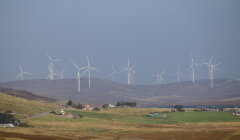Council / Is the council’s plea for a ‘Shetland tariff’ heard at government level?
Island leaders from across the UK meet for a second islands forum in the Isle of Wight
A CAMPAIGN for a special Shetland electricity tariff in recognition of the high level of fuel poverty locally appears to be going nowhere.
Shetland Islands Council made the case for the ‘Shetland tariff’ at the first UK-wide islands forum, held in Orkney at the end of September and hosted by the then Chancellor of the Duchy of Lancaster Nadhim Zahawi.
Reduced energy costs are also seen as one way to compensate local people for having to live in an increasingly industrialised landscape, and for islanders to directly benefit from renewable energy projects on their doorstep.
But as the council leadership prepares to travel to the second islands forum, due to take place in the Isle of Wight later this week, the UK Government appears to be taking the campaign not quite as seriously as they said they would.
Speaking to Shetland News when visiting the Kergord converter station earlier this month, the UK energy minister Andrew Bowie said that “of course” he was hearing the argument for a special tariff, but insisted that it would be a decision for regulator Ofgem to make.
“I completely see and understand why people see this as an inherent unfairness in that, as I said we are looking at a whole range of options where we go with community benefits moving forward,” he said.
“It could well be that there is some sort of trade off in terms of their energy bills but that is going to be a decision for Ofgem and we are looking at all the options moving forward.”
Become a member of Shetland News
The energy regulator meanwhile said that it had never heard of the ‘Shetland tariff’, and even if it had it had no powers to look into such as proposal.
“It’s not in our remit – it’s down to the UK Government which has powers to reduce the cost of electricity distribution in specified areas under Energy Act 2004,” a Ofgem spokesperson told Shetland News.
The spokesperson added: “We have no powers or process but [the] UK Government can make specific interventions under Energy Act 2004.
“The electricity and gas tariffs are set by individual suppliers and regulated by Ofgem via the price cap.”
Bowie also said the government was working towards having the cheapest, cleanest and most secure energy by 2035.
Meanwhile, Scottish rural affairs secretary Mairi Gougeon said last week while on a visit to the isles that she was sympathetic to the idea, but the Scottish Government had no powers in this regard.
“When it comes to energy policy, we don’t have the levers to control all of that, so can’t solve that and it is for the UK Government to try and address the fundamental unfairness and imbalances that exist within that,” she said.
“It is just not right to be at the forefront of all that innovation and not reap the benefits of it. That is something that needs to be addressed.”
Speaking before travelling to the Isle of Wight, council leader Emma Macdonald said making changes on the scale required would take time.
“After attending the islands forum, [SIC chief executive] Maggie Sandison and I had a meeting with Ofgem in October to have a wider discussion around what we had spoken about at the islands forum and also the letter which I sent to them,” Macdonald said.
“In all of these the inequity that residents in Shetland face with regards to electricity costs was a key element of our communication.
“This has also been made clear to all visiting ministers in both governments. This is particularly impactful when they visit Shetland and see the level of activity and potential for more.
“Change on this scale is something that will take time. I know that is of little comfort to those who are struggling with soaring bills, but it is very much a priority of this council to continue to make the case for the Shetland tariff and the clear reasons why this is the right thing to do.”
Meanwhile, Ofgem has confirmed that the next announcement on the energy price guarantee – currently £2,500 for an average household in the UK – for the period from 1 July to 30 September will be made on Thursday.
Become a member of Shetland News
Shetland News is asking its many readers to consider paying for membership to get additional features and services: -
- Remove non-local ads;
- Bookmark posts to read later;
- Exclusive curated weekly newsletter;
- Hide membership messages;
- Comments open for discussion.
If you appreciate what we do and feel strongly about impartial local journalism, then please become a member of Shetland News by either making a single payment, or setting up a monthly, quarterly or yearly subscription.


















































































